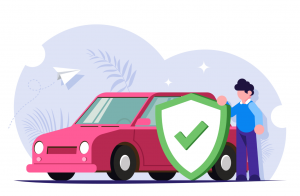Will I Get SR22 If I Drive Without Insurance?
By JD Glass
Every state with the exception of Vermont--who requires you to prove you can financially afford accident responsibility--requires every driver to have car insurance. If you don’t, there are penalties--and the first might be an SR22 requirement. What is that, you ask?
It’s a certificate the state requires of drivers who have some severe offenses on their driving record, and it’s directly related to you actually having driver’s insurance coverage--what it means, is that if you drive, you MUST have coverage AND the state needs to know that it’s active.
In addition to your insurance company filing the form with the state (because that’s who vouches for you - the insurance company), you may be provided with a paper certificate, or an electronic notation in your state file.
It’s a simple fact that those who don’t carry active car insurance put themselves and everyone else at risk. If you cause and accident and you don’t have insurance, you might very likely lack the funds to repay anyone for their losses, including your own.
This is one of the larger reasons that driving uninsured could result you in being required to have an SR22 form.
If driving uninsured is the reason you got the SR22 requirement, you’ll have to restart your coverage, and you may find yourself with challenges with the insurance.
Because you’ve willingly driven without insurance before, the company may think that you’re likely to do it again, which means the insurers risk losing their investment in you. Because of this risk, they’re also likely to charge you more.
There are some insurers who view SR22 drivers as too high of a risk to insure and they may even refuse to issue you a policy, making your search just that much more difficult.
There are insurers (like Consumers) who do cover SR22 drivers!
These are the things to look out for so you don’t let it lapse:
Failure to renew before your term expires
Failure to let the insurer know if you’ve received tickets, gotten into any accidents (or even got an SR22!)
Failure to update the policy if you’ve changed addresses, vehicles, or even added one.
And the biggest one: failure to pay your premium.
Keep on top of all of these to prevent a lapse in coverage. If your coverage does lapse, then you’re likely to run into further issues, the very least of which being that your SR22 penalty time period will increase.
Yes, you will get reminders from the company about when to pay and when to renew, but don’t just rely on that. Make sure you review, renew, and update when needed.
Talk with your insurer about how to keep active and up to date with your policy. They can offer you options such as automatic payments--which deducts the premium from your account regularly, while automatic renewal will make sure you renew your coverage--provided you don’t choose to switch policies.
If you make a change, such as a move, get a new car, or even receive further charges on your driving, call or email your agent and insurance right away--this way your policy can be updated and you can be sure to always have the protection you need.
And speaking of moving, if you do in fact move to a state that doesn’t require SR22s, the one you already have will remain active, and generally speaking you, need to maintain the coverage, as part of the requirement for getting a license in the state you’ve moved to.
SR22 coverage can take a few days and even up to a month to become active, so as soon as you get everything you need, make certain to contact your agent, so you can find out your next steps and get back on the road.
www.consumerschicago.com
Every state with the exception of Vermont--who requires you to prove you can financially afford accident responsibility--requires every driver to have car insurance. If you don’t, there are penalties--and the first might be an SR22 requirement. What is that, you ask?
It’s a certificate the state requires of drivers who have some severe offenses on their driving record, and it’s directly related to you actually having driver’s insurance coverage--what it means, is that if you drive, you MUST have coverage AND the state needs to know that it’s active.
In addition to your insurance company filing the form with the state (because that’s who vouches for you - the insurance company), you may be provided with a paper certificate, or an electronic notation in your state file.
It’s a simple fact that those who don’t carry active car insurance put themselves and everyone else at risk. If you cause and accident and you don’t have insurance, you might very likely lack the funds to repay anyone for their losses, including your own.
This is one of the larger reasons that driving uninsured could result you in being required to have an SR22 form.
The only way to get that is via an auto insurance agency.
If driving uninsured is the reason you got the SR22 requirement, you’ll have to restart your coverage, and you may find yourself with challenges with the insurance.
Because you’ve willingly driven without insurance before, the company may think that you’re likely to do it again, which means the insurers risk losing their investment in you. Because of this risk, they’re also likely to charge you more.
There are some insurers who view SR22 drivers as too high of a risk to insure and they may even refuse to issue you a policy, making your search just that much more difficult.
There are insurers (like Consumers) who do cover SR22 drivers!
The most important thing if you have SR22 is to keep your coverage active!
These are the things to look out for so you don’t let it lapse:
Failure to renew before your term expires
Failure to let the insurer know if you’ve received tickets, gotten into any accidents (or even got an SR22!)
Failure to update the policy if you’ve changed addresses, vehicles, or even added one.
And the biggest one: failure to pay your premium.
Keep on top of all of these to prevent a lapse in coverage. If your coverage does lapse, then you’re likely to run into further issues, the very least of which being that your SR22 penalty time period will increase.
Yes, you will get reminders from the company about when to pay and when to renew, but don’t just rely on that. Make sure you review, renew, and update when needed.
Talk with your insurer about how to keep active and up to date with your policy. They can offer you options such as automatic payments--which deducts the premium from your account regularly, while automatic renewal will make sure you renew your coverage--provided you don’t choose to switch policies.
If you make a change, such as a move, get a new car, or even receive further charges on your driving, call or email your agent and insurance right away--this way your policy can be updated and you can be sure to always have the protection you need.
And speaking of moving, if you do in fact move to a state that doesn’t require SR22s, the one you already have will remain active, and generally speaking you, need to maintain the coverage, as part of the requirement for getting a license in the state you’ve moved to.
SR22 coverage can take a few days and even up to a month to become active, so as soon as you get everything you need, make certain to contact your agent, so you can find out your next steps and get back on the road.
www.consumerschicago.com


